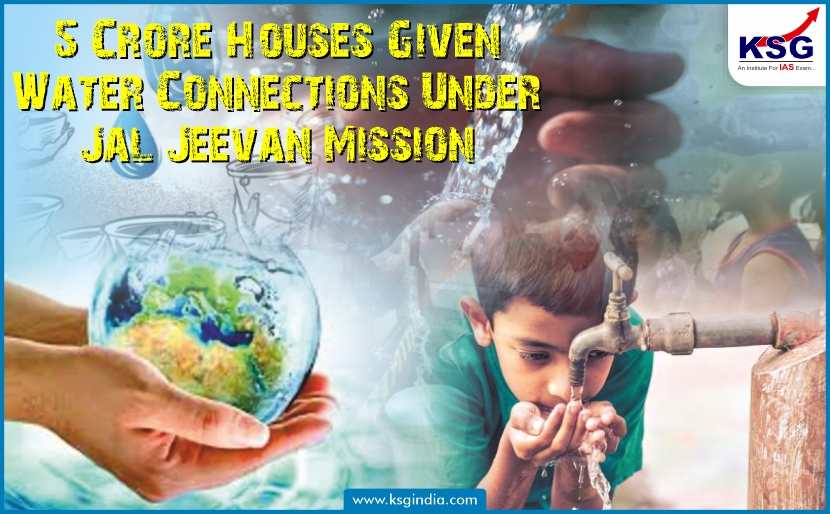5 Crore Houses Given Water Connections Under Jal Jeevan Mission
Since the launch of the Jal Jeevan Mission in 2019, five crore households have got water connection and now tap water is reaching every household in about 1.25 lakh villages.
5 Crore Houses Given Water Connections Under Jal Jeevan Mission
Since the launch of the Jal Jeevan Mission in 2019, five crore households have got water connection and now tap water is reaching every household in about 1.25 lakh villages.
Important Highlights
- The Prime Minister said the mission is not just about bringing water to people but it is also a decentralisation movement that is village and women-driven.
- The Prime Minister also launched the Jal Jeevan Mission app for improving awareness among stakeholders and for greater transparency and accountability of schemes under the mission.
- Rashtriya Jal Jeevan Kosh was also launched, where any individual, institution, corporate or philanthropist, be it in India or abroad, can contribute to help provide tap water connection in every rural household, school, anganwadi centre, ashramshala and other public institutions.
- Out of over six lakh villages, pani samitis/village water and sanitation committees (VWSC) have been constituted in around 3.5 lakh villages. More than 7.1 lakh women have been trained to test the quality of water by using field test kits.
- To realise the Prime Minister's vision of 'Sabka Saath, Sabka Vikas, Sabka Vishwas, Sabka Prayas', and following the 'bottom up' approach, the Jal Jeevan Mission is implemented in partnership with states with a budget of ₹3.60 lakh crore.
Jal Jeevan Mission
- Every rural household has drinking water supply in adequate quantity of prescribed quality on regular and long-term basis at affordable service delivery charges leading to improvement in living standards of rural communities.
Jal Jeevan Mission is to assist, empower and facilitate:
- States/ UTs in planning of participatory rural water supply strategy for ensuring potable drinking water security on a long-term basis to every rural household and public institution, viz. GP building, School, Anganwadi centre, Health centre, wellness centres, etc.
- States/ UTs for creation of water supply infrastructure so that every rural household has Functional Tap Connection (FHTC) by 2024 and water in adequate quantity of prescribed quality is made available on a regular basis.
- States/ UTs to plan for their drinking water security
- GPs/ rural communities to plan, implement, manage, own, operate and maintain their own in-village water supply systems
- States/ UTs to develop robust institutions having focus on service delivery and financial sustainability of the sector by promoting utility approach
- Capacity building of the stakeholders and create awareness in community on significance of water for improvement in quality of life

